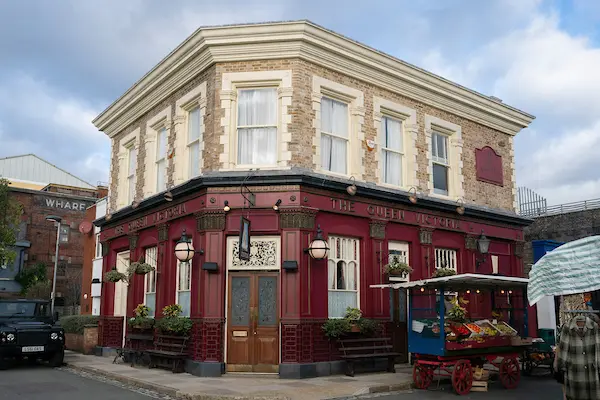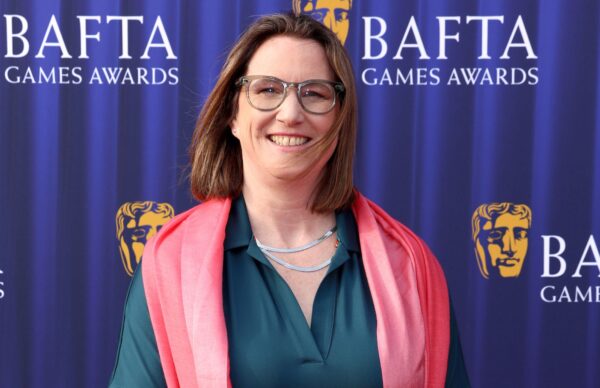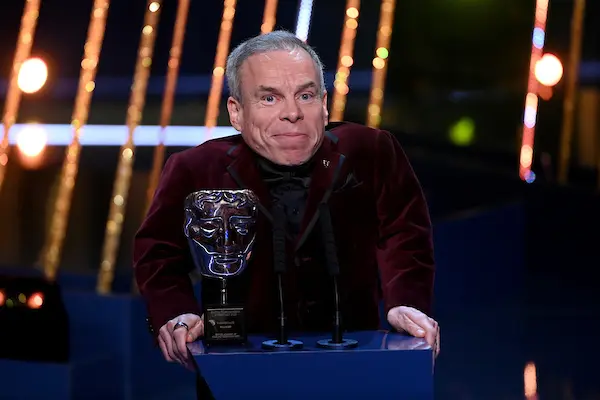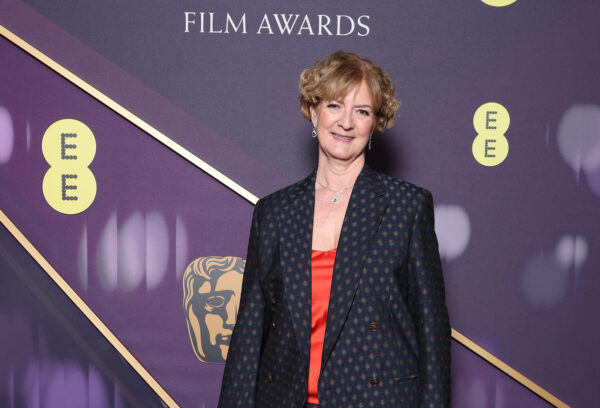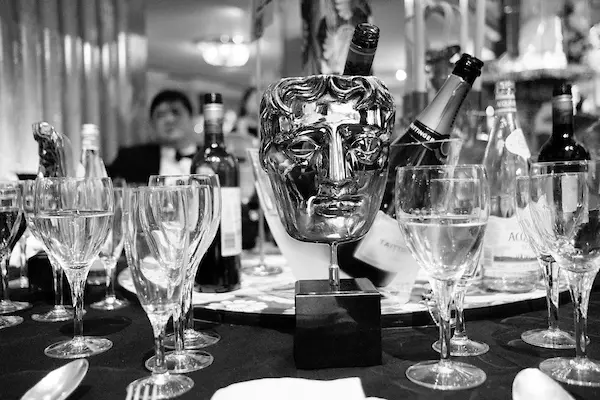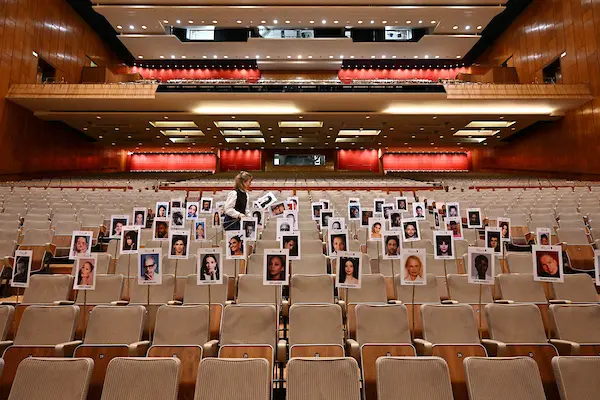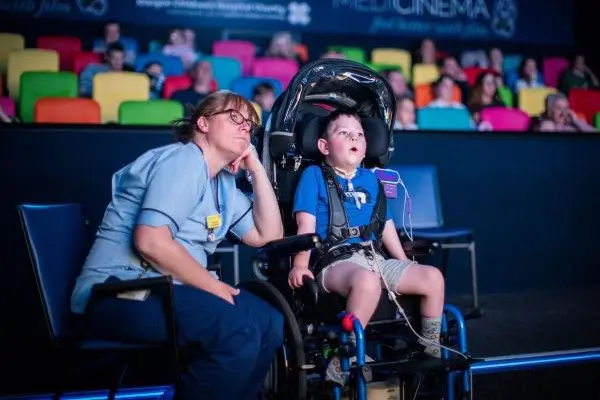Mariayah Khaderbai: Hello and welcome to the 2022 BAFTA Film Sessions, where you will hear from this year’s EE British Academy Film Award nominees across fourteen events.
You can find out about the upcoming sessions on bafta.org and please join the conversation online using the hash tag #EEBAFTAs. This session will run for about thirty minutes and you’ll have an opportunity to ask questions throughout. If you’re tuning in via YouTube or Facebook, please add your questions to the chat, or if you’re joining us on Zoom, please use the Q&A function below. There are closed captions and available and BSL interpretation.
This is our very first session and it’s in celebration of the EE Rising Star Award. This session is in partnership with EE who have partnered with the British Academy Film Awards for twenty-five years. Now in its seventeenth year, the EE Rising Star Award, voted by the public, continues to shine a spotlight on the phenomenal skills of upcoming acting talent throughout the world, nominees whose outstanding performances over the past year have captured our attention. So without further ado, I’m really pleased to say we’re joined by one of those nominees this evening, the fabulous Millicent Simmonds. Welcome, Millicent.
Millicent Simmonds: Hello, thank you so much for having me here this evening. I’m really honored and just so humbled to be here with all of you.
MK: Congratulations, first of all, on your nomination. I wanted to ask you where you were when you found out and how it feels to be an EE Rising Star nominee.
MS: So when I found out about this, that I was being nominated for such an award I was, I was so overwhelmed and I was nervous. But I did my research on what the award actually was and what it meant. And that’s when I found out what a big deal this is and then I saw who the other nominees were and they’re so skilled and such brilliant actors; to be considered on the same level as all of them—it’s just been incredible. And at the time that I found out
I was at home in my office and my publicist called me and said Millicent, you need to sit down, you’re being nominated for this award, and I really did need to sit down for it.
MK: Well congratulations, it’s really well deserved.
MS: Thank you, thank you so much.
MK: I want to talk to you just about your career as an actor. Is it something that you always wanted to do growing up?
MS: No, in fact I never even thought it was possible. So it wasn’t something that yeah, it wasn’t–just it wasn’t in my vision for my future.
So I’m as surprised as anybody else is to see where I am right now.
MK: So what was your pathway in then?
MS: Well, I auditioned for Wonderstruck based on a recommendation from my drama teacher at the time. She really wanted me to do this, so I auditioned and two weeks later I got called and told to come to New York and start acting and here I am now, five years later. I have absolutely fallen in love with it.
MK: Oh God, it’s crazy that it’s only been five years. Wonderstruck, directed by Todd Haynes, that must have been quite a first experience of kind of working with a director like that. What will your first days on set like?
MS: Oh my God, so obviously at that age I didn’t know what a big deal it was to be working with Todd Haynes but looking back on it, I should have known. He’s incredibly brilliant, kind, and he never treated me like a child. He did really guide me through the process. He was very specific about his vision for Wonderstruck and that really helped me. I mean, just a gorgeous human being. I am so lucky to have had him in my first experience and you know he really wanted me to continue acting after that.
MK: And so you wanted to continue acting after that, did you have to kind of–did you decide to maybe go to drama school? Or did you look for different parts or out there? What was the process did you had? Did you get an agent kind of from the back of doing Wonderstruck?
MS: Well, after Wonderstruck I definitely had decided at that point that I was interested in continuing. But I didn’t go and take acting classes, that didn’t really occur to me. What I did do was auditioned for a lot of different parts and one of those was for A Quiet Place.
MK: Thank you for the segue into A Quiet Place. Was that a straightforward casting call?
Or kind of, had you know, had the director heard about you?
MS: Well, from my understanding John had reached out to Todd and did ask him about me. So hopefully Todd said some nice things about me, but I did do an audition. I sent them everything they asked me and then it was just a few days later when I got a personal email from John who said ‘you’re my daughter now, welcome to the family.’
MK: Wow, that must have been a really great email to receive!
MS: I know! I mean it was a very much an Oh my God moment this is going to change my life again.
MK: So when you read the A Quiet Place script for the first time—It’s a horror film but unconventional in so many ways. What were your first thoughts when you wrote the script?
MS: Well, my first thought when I read the script was this was a kind of story that is really different from what we’ve seen before. So usually when deaf characters are spot lit you don’t see them as the hero of the story. So when I read it, I knew I needed to be a part of this. I also really liked the horror aspect. And to be able to work with John, I mean how could
I possibly say no to him?
MK: It must have been really interesting to work with a director that’s also an actor as well. What elements did he bring to that for you?
MS: Well, I think it actually helped our connection and made it much easier ’cause he knows what it’s like to be an actor. And in that way we could really connect on the same level. We did a lot of sort of playing around on the set in terms of exploring the characters and really diving deep. So he didn’t just participate as a director, giving orders, right? It was much more fun, much more collaborative.
MK: The one thing that the film hinges on the in the first film is the unity of the family, and the believability that this is an authentic, real family unit, and I’m wondering how you worked with the cast to build it together. Were there any fun family bonding exercises that you did together?
MS: Yes, yes. So in the first movie, Noah and I were welcomed to go to John’s home. We had burgers and, you know, hung out with their daughter. They were just, they were so sweet.
Uhm, it was a really tender moment for all of us and I think that really helped us to bond.
MK: Yeah, you can really, really see that in the film. It’s a really believable unit. I want to ask how you—we’ll come to the second one in a moment, but just for the first one how you got into character? Do you have any tricks up your sleeve for focusing yourself?
MS: Well, I was still quite new to acting at that time, so I tried to sort of contribute my own life experience because I think that Regan and I were quite similar in a lot of ways, especially with her being deaf and me being deaf. And then also, you know with the other actors, in order to be authentically scared, seeing them being scared and sort of practicing that, you know there’s an energy that takes place in the room and that was really beneficial to my performance.
MK: I have always thought, especially with something like this, like how do you create fear and tension?
MS: So it’s—I’ve got a sort of funny story about this. So Noah and myself and Emily would you know, laugh a lot and joke around quite a bit on set. But to bring that sort of ‘I’m scared’ energy was difficult. But so, for example, Emily and Noah were really both skilled in their own way, and I feel like I was able to capitalize on that, and they really helped me, yeah.
MK: And when you were making it, could you ever imagine kind of the global phenomenon that the film would have become? I believe the premiere was in a crowded Film Festival, so that must have been your first experience of going to a Film Festival as well, maybe?
MS: For A Quiet Place, no. Actually I had gone to Cannes for Wonderstruck.
MK: Of course.
MS: So that was a life changing moment for me.
MK: Uhm and then skipping forward past the couple of years after A Quiet Place is being released. Did you ever think that a sequel was on the cards?
MS: No, I didn’t know. I didn’t know, but personally I was always really curious about, you know, what happened to this family after the end of the first movie and did they survive? You know I have a spot for them in my heart, so when I was reached out to about the second movie I was relieved and excited that I was going to find out what happened next.
MK: So when John reached out to you about the second film and he proposed the idea of a lot of it being centered around your character, were you filled with excitement or were you filled with a slight bit of terror?
MS: Yeah, of course, of course there was terror there. I was going to be leading a major film, so yeah, naturally I was scared. But I mean the fact that he wanted me to be a part of this says a lot about his belief in me. So you know, and again, how can I say no to him? It was such an amazing idea in terms of the sequel and then also the opportunity to work with my family again.
There’s no way I was going to say no to that.
MK: Oh yeah, how was it—does it feel, because so many of the cast and crew were the same in the second film as well, is there an ease and comfort to that? To working with them again? A common language that you share?
MS: Oh for sure. Oh, I’m sorry I missed that.
MK: Is there a common language that you share on set?
MS: Yeah no, absolutely for sure. It was so much easier to work with everyone because we already had come up with a way to work together and offer each other support. We knew what the others needed in order to be successful. And you know everybody on the set was a really, you know, we were all really good people and we were also really excited to introduce the newer people in the second to the world that we had already created.
MK: Yeah, so many of your scenes were with Cillian Murphy. How was that working with him? Do you have some similar styles of working together or did you have to adapt to each other?
MS: No, I wouldn’t say there was a lot of adaptation. We did work very similarly, but I will say that you know we’re both quiet people but we did spend quite a bit of time brainstorming and playing around with the idea of our characters on set and we spent a lot of time talking with John, suggesting a lot of ‘what ifs’ and different scenarios and how they might play out. And we also both really like to read so we talked a lot about the books that we were that we’ve read and were reading. So we had some really nice moments.
MK: Yeah, your energy on screen, both of you is very similar. It’s very kind of stoic, so yeah, I think you really complemented each other in that way as well. I’m wondering, kind of for other actors starting out now kind of if they’ve you know had a similar trajectory to you.
And now that you’ve kind of been the star of this film, did you have a little bit more confidence to bring ideas of your own to the table? Did you feel easier approaching John with certain you know scenes and saying, you know, I think my character might do this this way?
MS: So I’m thinking of a parallel experience— Kaylee Hottle who was on Godzilla. So seeing somebody like her, I mean, in such a massive, huge movie and the moment that she had and the strength in her character, I was really excited for her and I really wish her all the best.
And I hope that she’s, you know, having a lot of fun. But for me, working with John and coming back on set with everyone was a really special time. And yes, I definitely was able to share my ideas with John. I mean, that’s he’s the kind of person that you can do that with.
MK: Can you talk about any particular scenes that were really, really tough to shoot?
MS: Well, in general the physicality in the second movie made it much more challenging than anything I’ve done before. So I did a lot more running and with no shoes on right.
I had bare feet when I was doing a lot of the running, so my feet did get really dirty. It was also emotionally heavier. But the whole film was challenging to make.
MK: Yes, so much of it hinges on you, so I can imagine you know the physical and mental toll must have been, yeah, quite immense.
MS: Absolutely.
MK: How do you unwind at the end of kind of a long day when you’re shooting?
MS: I take really long showers every night. I scrub all the dirt off of me, all the work off of my feet and just the rocks off my feet and everything and I just get really clean and I go to sleep. I spend a lot of time sleeping.
MK: And are you the kind of actor that stays in character in between takes, or do you kind of have to decompress?
MS: No no, no I don’t maintain my character, so every time I’m on the set with Emily and Noah, we spent a lot of time laughing and just being silly and playing off of each other and chatting. I don’t think I could, you know, maintain that level of terror the entire time we were filming.
That would have been way too exhausting.
MK: Yeah, I can imagine it was a really, really fun set to be on as well. Uh, and something I’ve always been curious about, and obviously you’ve got these large monsters coming at you, but obviously all created in visual effects afterwards. How do you kind of, you know, stay in character and have that terror, you know?
What is it that’s dangled in front of you?
MS: Yeah, yeah, that was definitely difficult to feel that scared on set, but we had a cardboard cut out of monsters so we knew where the placements were and that kind of gave us an idea of what they were going to look like in those particular moments. But again, you know, in working with the other actors, we really fed off of each other and being in that situation in that room and making it feel a bit scarier.
And then they made it dark, you know there were little things that we did that really helped us along.
MK: I’m hoping that most people now had obviously a chance to see this film. It has been released for some time, so I can imagine that when you were first talking about it, you were scared of the spoilers. Uh, but now do you think the way that it ended there is the possibility opportunity for another film? Is that on the cards? I know that a lot of people at home would be wanting to see that.
MS: Yeah, I think we all want a third.
We want to see, yeah, I think a lot of people want to see more about this family. I think this is a really special family unit. You know, and obviously we want to see them survive at the end of the day. We want to see them save the world. I do too, I want to see that as well!
MK: And I know that you’ve only been working for kind of just a few years, and you’re kind of new to the world of filmmaking but do you have aspirations to work behind the camera? For instance, you want to write, direct, maybe produce?
MS: Yeah, I do, absolutely. I’m currently developing a TV series, which I’m also a producer on and I’ve been learning a lot about behind the camera work and you know, seeing how things come together behind the camera and how hard and how long these projects really take much more of a time investment than I thought. But it’s also really exciting and I’m super motivated. So, yeah and one day I would love to do more behind the camera. Fingers crossed.
MK: I guess that’s one thing as well that people don’t understand that a project can take between two and five or six years, so you have to really want to do it and be really invested in it and kind of be passionate about it to, to have kind of such a large amount of your life play out like that.
MS: Yeah, absolutely. But I think that the best thing that you can do is enjoy it ’cause if you don’t enjoy it and it doesn’t bring joy to you then there’s really no point of being involved with a project like that.
MK: Just going back to Regan and your character, she is fearless and such a role model.
Do you sometimes think in your everyday life what would Regan do in this situation?
MS: Oh my gosh, all the time. Because I’m quite shy, I’m a very laid back kind of person. But yeah, I do sometimes think about her when I need to put myself out of my comfort zone and demand things that I need and obviously and to help others as well. It’s not just me. I think a lot of people can learn from Regan.
MK: Definitely. Uhm, you have become a role model and rightly so for actors coming up now, for the deaf community. What does it mean to you to be a role model and did you have any role models when you were growing up?
MS: Yeah, Oh my God, to be in this position as a role model because I didn’t have deaf role models when I was growing up. And when I was growing up, I really looked up to my mother and my father and Malala. I had read her book and it really touched me. I’m so grateful to have an education and to continue learning. But yeah, to be a role model for other children really makes me want to do the best that I can. And I also want to show, you know, I’m not a perfect human and that it’s OK to be imperfect. It’s OK to make mistakes and learn from them.
MK: We’ve had some questions from the audience at home, so I’m just going to pull these up now.
MS: Ok.
MK: Who would be a character from literature or maybe comic books that you would want to play? And that’s from Anna Kosell.
MS: Oh, that’s a hard question! I’m not pulling up anyone right now, but uhm, from a comic…
MK: We can come back to that if you want.
MS: Yeah, let’s do that.
MK: Yeah, Samuel Goulding is asking what’s the best piece of advice a director has given you?
MS: Oh my God, to not be too shy or too afraid to share your ideas and make proposals. You know, that it’s really a collaborative experience and you should be able to express your own experience and not be afraid to say something ’cause you could make changes, changes for the better.
MK: And another question that’s come in, it might be the same advice or something else, but what advice would you give to teenagers who wanted to get into acting right now?
MS: Yeah, I would say do your research, take acting classes and then join drama club. I mean that’s what I did growing up and personally I think being part of a drama club really helped me. But only do it if you enjoy it.
MK: I’ve got another question here saying now that you’re producing your first project, True Biz, how does that change your creative and acting process for you?
MS: Right, yeah, so as an actor I’m, you know I have to be on set, I have to be ready know my lines but then to be involved with the project from the onset, from day one, is a lot harder than I thought it was going to be. You have to make sure you have the right people around you and that requires meeting a lot of people. But it’s also been a really cool experience and you have a lot of decision-making power over the whole process and you could be super creative and involved in the decision-making. And you know, I’m learning as I go, I’m learning as much as I can.
MK: And then, someone asking about kind of films and your household: Is there a film that unites your household?
MS: Well, we really love Spirited Away. It’s my favorite movie when I was growing up. So I think, you know I gave that to my younger sister so she just saw it and I’m excited to be able to share, you know, those kinds of moments with her, with them.
MK: If you could play any of your fellow Rising Stars’ nominated roles, which one would you choose and why? I should remind the viewers at home who those other nominees are as well, so it’s Ariana DeBose from West Side Story, Harris Dickinson from The King’s Man, Lashana Lynch from No Time to Die and Kodi Smit-McPhee from The Power of the Dog.
MS: So I would love to do a James Bond. I mean, that’s a classic, isn’t it? I mean, I don’t know that you can beat that!
MK: And we should also say the vote is still open for EE Rising Star Awards, so we’ll paste the link for that in the chat. But you can also go to EE and BAFTA and find the link for that as well. Have you ever let a spoiler slip and ruined the film for someone?
MS: Oh my God, I think I’m actually really good on that front. I’ve not given any spoilers. Yeah, nobody’s been able to get any spoilers out of me and I’m very proud to say that.
MK: It must have been very, very difficult with A Quiet Place, too. Very difficult indeed.
MS: Yes, yes, yes. So many people are like ‘tell me what happens next.’ It was hard, but I did it. I’m trustworthy.
MK: You are, I can tell that about you.
MS: Oh, I’m relieved.
MK: Who is the unsung hero on set? Out of all the crew.
MS: Yeah, I mean I would say that we all got recognition. So I don’t know that anybody missed out. Or yeah, we all really got on we enjoyed each other.
MK: I think this could be from the point of view of kind of there’s hundreds of people on a crew that perhaps the people at home don’t know about that takes to make a film, so maybe one of those people that you know that.
MS: Sure, I mean behind the camera it’s impossible to pick just one individual because we were all equals on set. If one person wasn’t involved, it wouldn’t have been the movie that we made, so I think yeah, we all put in, you know, blood sweat and tears to make this happen.
MK: And Anna is asking do you have a dream director that you’d like to work with?
MS: So I’m going to go with Cate Blanchett. I loved her in Blue Jasmine. I thought she was really amazing.
MK: And then out of the last kind of films that you might have watched recently, is there a memorable one that has stuck out for you?
MS: Yeah, so I recently just watched Spencer. And there was a particular moment, well Oh my God, I can’t think of particular moment because the whole thing that she did I mean from the wardrobe, the set, the background, everybody around her did a phenomenal job. I loved everything about that movie.
MK: Where and with who is your favorite way to enjoy a film?
MS: Well, I’m going to go with my brother and definitely at home sitting on the sofa sharing popcorn. My brother and I have very similar tastes in movies, so it’s really easy for us to enjoy them simultaneously.
MK: Uhm, and as the EE Rising Star Award is a celebration of upcoming talent that’s hitting the acting world by storm, is there anyone that you would kind of want to share with the world at moment, some talent that we might not have heard of?
MS: Yeah so I was really captured by Kaylee Hottle and her performance in Godzilla. I think it was so incredible and she’s so young, it must have been really difficult. So yeah, I thought you know, kudos to her.
MK: Thank you so much for this evening Millicent and for your time. Thank you to our partners EE for this session. The vote is still open like I’ve said, so please go and see all those films. You can go to ee.co.uk/BAFTA to vote. This session will be available on our YouTube channel shortly. Uhm, yeah, and wishing you all the best for the future Millie and good luck!
MS: Thank you so much for having me here. I’ve been really honored. Yeah, just I’m so grateful. Enjoy the rest of your evening.
MK: You too!





